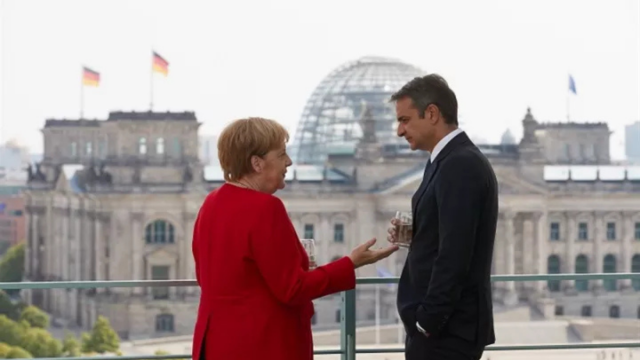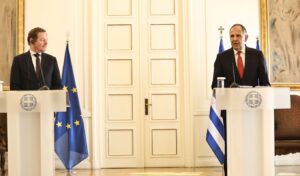What did Angela Merkel say, irritated, in a closed European Union Summit? What did Donald Trump know about the Greek economy? How did Tayyip Erdogan handle… Pinat? These and many other behind-the-scenes revelations are disclosed by Alexis Patelis in his new book “The Great Return: The Road to Greece’s Credibility” (Papadopoulos Publications).
The Mitsotakis meeting with Angela Merkel about the occupation loan in Alexis Patelis’ book
The head of Prime Minister Kyriakos Mitsotakis’ economic office from 2019 to 2024 picks up the thread from summer 2019, with capital controls still in effect, and describes the Greek economy’s recovery through obstacles and difficulties. For the first time, he reveals that in October 2021, during her visit to Athens, Angela Merkel spoke to Kyriakos Mitsotakis about the occupation loan – the forced loan that Greece had given to the Third Reich and which was never repaid. “May I ask you about the occupation loan? Perhaps it’s time to leave it behind?” asked the then German Chancellor. “Absolutely not,” the Greek Prime Minister answered curtly.
First impressions of Mitsotakis at Davos
Let’s pick up Patelis’ narrative thread from the beginning. In January 2020, Kyriakos Mitsotakis participated for the first time in the World Economic Forum proceedings in Davos. There, among others, he met Microsoft President Brad Smith. As Mr. Patelis describes, “less than a month later, Brad Smith, accompanied by a colleague, visited Maximos Mansion for a follow-up meeting. In the waiting room, where I welcomed him while we waited for the Prime Minister, he confided to me: ‘Every year I have 40-45 meetings at Davos. This year, of all the meetings, the one with the Greek Prime Minister was by far the most impressive. He is one of the most visionary leaders.'”
The crucial decision for the first lockdown
Shortly after, the coronavirus pandemic broke out, surprising all of Europe and naturally the world. Mr. Patelis reveals for the first time what was said in the first meetings behind closed doors at Maximos: “On March 12, we were in a major meeting under the Prime Minister at Maximos Mansion, when health officials proposed closing all commercial businesses and banning circulation. I interrupted the discussion and exclaimed: ‘What are you saying now? The economy will collapse!’ The Prime Minister agreed with me: ‘These things cannot be done. The cost would be enormous.’ Two days later, he changed his mind. He decided alone that the first total lockdown had to be implemented and immediately ordered everything to be closed. Later, he explained the sudden change in his decision to us: ‘It was obvious, from other countries’ experiences, that sooner or later, we were heading there. The fact that we had few cases was not a reason not to decide on lockdown. On the contrary, it was a reason to expedite it, as we had better chances to control the pandemic in our country, with closed borders and strict restrictions.'”
The then economic advisor to the Prime Minister characterizes his decision as life-saving for the country, as it avoided the worst of the pandemic’s first wave.
Greece’s inclusion in the ECB’s quantitative easing program
For the Greek economy, it was, given the conditions then, of decisive importance to enter the ECB’s quantitative easing program. Mr. Patelis describes how Mr. Mitsotakis convinced European Central Bank head Christine Lagarde, after prior coordination with Yannis Stournaras who had also made the necessary moves.
“On March 18, a phone appointment took place between Christine Lagarde and Kyriakos Mitsotakis. Absolute quiet prevailed in his office. I looked at his surface – as always, clean of many papers. With steady calm in his voice, he clarified that Greece of 2020 was not the Greece of the previous decade: ‘Today we are the most reform-minded government in the eurozone. There is no longer reason for my country to be treated differently.’ But caution was needed. Central banks don’t react well to political pressure. The discussion had to be based on technocratic arguments.”
Tensions with Merkel at the EU Summits
During those critical days, the idea of joint borrowing to support national economies was put on the table by European prime ministers, including Mr. Mitsotakis. At the Summit, which was necessarily held by videoconference, the German Chancellor was negative. “In her intervention, Merkel referred to Eurobonds, which had been requested by nine state leaders in a letter they had sent the previous day. ‘Don’t propose things you know won’t happen and don’t shoot down an ESM program before it’s even created,'” Angela Merkel said, as Mr. Patelis describes.
He also reveals exactly what Kyriakos Mitsotakis said at that decisive Summit of the “27”: “In his intervention, our Prime Minister was direct: ‘I hear words like ‘biblical’ and ‘unprecedented,’ and I see a disproportionate text of conclusions (from the Summit). I want to be clear: If we continue like this, I won’t be satisfied.’ ‘The countries that signed the letter represent 57% of GDP,’ he added. ‘If we don’t react as leaders, we’ll simply push the ECB toward even larger bailout programs, which will create greater systemic stability risks and – why not? – inflation.’ It was one of the interventions where the Greek Prime Minister began to stand out in European affairs. Other interventions followed on crucial issues, which over time established his prestige and respect among European leaders.”
On April 23, another Summit was held by videoconference. Mr. Mitsotakis, as Mr. Patelis recounts, reminded that Mrs. Merkel was the only leader still in position since Greece had requested the first memorandum. “A decade later,” the Greek Prime Minister told his European counterparts, “the mistakes made then must not be repeated. The leaders’ response must be forward-looking, focused on subsidies not loans, and be enormous, worthy of the crisis’s severity.”
The strategy for reducing social security contributions
In September 2020, from the podium of the Thessaloniki International Fair, Kyriakos Mitsotakis announced that social security contributions would be reduced by 3%. What preceded this is narrated by Mr. Patelis: “‘President, is the abolition of the solidarity contribution included in the TIF package?’ ‘It’s not enough. The time has come to take a risk. You will include a three-point reduction in social security contributions all at once from the new year,’ the Prime Minister intervened. ‘Such an opportunity to implement our program won’t appear every day.’ It was late August 2020. In the meeting, we were completing the package that Kyriakos Mitsotakis would announce at the Thessaloniki International Fair (TIF) two weeks later.”
The Mitsotakis – von der Leyen dialogue
The book also reveals the Commission President’s reaction when informed of Greece’s plan for utilizing resources from the European Union’s Recovery and Resilience Fund: “‘Your plan is music to my ears.’ On the screen at Maximos, European Commission President Ursula von der Leyen. We had just completed the presentation of the Greek Recovery and Resilience Plan within the Recovery Fund framework. ‘I’m truly excited about what I’m hearing. Greece could serve as a model for other member states.'”
The Plan needed a name though. Various proposals fell on the Maximos Mansion meeting table: “Theseus,” “Jason,” “Odysseus.” The Prime Minister took the floor and said: “Greece looks forward, not to its past. In the 200 years of the modern Greek state, we’re designing our future: With young people, with digitization, we’re designing our next, better version.” And thus, the Plan got the name “Greece 2.0.”
In early December 2023, the camera lens captured Pinat entering between Kyriakos Mitsotakis and Tayyip Erdogan, during the Turkish President’s reception at Maximos Mansion. As Mr. Patelis remembers, “a Prime Minister colleague gave him a treat, obviously to keep him quiet. Then Erdogan turned and, joking, asked the Prime Minister: ‘Are you sure you’ve fed him?'”
Meetings with Trump
Another revelation Mr. Patelis makes in his book concerns an idea that had fallen (he doesn’t mention from whom) at Maximos Mansion for a program to acquire Greek citizenship for wealthy foreigners. The Prime Minister, as he describes, cut it like a knife. “Greek passports are not for sale,” Mr. Mitsotakis said.
Here’s what Alexis Patelis remembers from his first trip to Washington and Kyriakos Mitsotakis’ meeting with Donald Trump in January 2020: “We arrived at the White House in the midst of a snowstorm. Entering, one could not help but be impressed by Melania Trump’s beauty. During the introduction, we were being introduced to President Trump. When my turn came, I shook his hand and said: ‘Alexis Patelis, economic advisor to the Prime Minister’ and added in the five seconds I had available tête-à-tête: ‘We’re cutting taxes and implementing reforms.’ ‘I know,’ he answered immediately, as if he knew what I would tell him, and quickly moved to the next person.”
Published in Parapolitika




